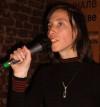Poet
Halyna Petrosanyak

Halyna Petrosanyak
(Ukraine, 1969)
© Ihor Sid
Biography
Ukrainian poet and literary translator Halyna Petrosanyak was born in 1969 in a tiny village in the wildest part of the Carpathian Mountains on the edge of the Romanian border. The writer Yuri Andrukhovych has remarked that this is a part of the world where only the bears and vampires in Transylvania dare roam beyond her village. Petrosanyak is part of what has been called “The Stanislav Phenomenon” in Ukrainian literary culture. Stanislav is the former name of Ivano-Frankivsk, the quiet, provincial city near the foothills of the Carpathian Mountains where she resides. “The Stanislav Phenomenon” refers to the fact that a bevy of brilliant, philosophically-oriented postmodernist writers including Yuri Andrukhovych, Yuri Izdryk, Volodymyr Yeshkiliev, and Taras Prokhasko have emerged from this somewhat unexpected place on the periphery of Ukraine and on the edge of untamed mountain nature. The very word ‘phenomenon’ also echoes the phenomenological quest at the core of virtually all of these writers\'s works, a paradigm into which Petrosanyak’s poetry fits.I first met Halyna three years ago at a translation studies conference in the Carpathian Mountains in the scenic resort town of Yaremche where a swift mountain river runs noisily down a mountain pass. Back then she gave me a copy of her slim second volume of poetry. Halya struck me as a shy, introspective person. She was also tall and remarkably thin. There was an avian quality about her in her bearing, in her gestures, in her eyes, in the shape of her hair. She was there, but seemingly ready to take flight at any moment, just like the migratory bird of her poetry. Her poetry impressed me immediately as being very different from other Ukrainian poets I had translated before. It was fresh, like the mountain air of Yaremche, yet fragile. No pretension, no oversized intrusive poetic self. There was a spareness to her words, a minimalism. I sensed a poet flowing between two worlds — that of the wild and majestic Carpathians with their swift running mountain streams and that of the urban world of civilization and its enduring architectural past. Her poetic project to date has been in part a reconstruction of a nostalgic Prague and Vienna, a Hapsburg Empire in which Ukrainian cultural growth flourished until the destructive onslaught of World War I and later the Soviet empire. A third line running through her poetics is the world of Ancient myth that serves to allow her to distill her particular emotional state in her own time and space. And like Petrosanyak, many of the figures of myth on which she meditates like Theseus and Odysseus are travelers on a quest.
There is a dramatic sense of place in Petrosanyak’s poetry, from mountain localities for her that are “a trap for time” with ”wintry landscapes — harsh majestic places” where frozen trees sing “filled with longing, like the sound of a shepherd\'s flute —“ to scenes of the jazz musicians playing on the Charles River Bridge in Prague and the puppeteers on Stefanplatz in Vienna. The poems of Petrosanyak are akin to telegraphically terse poetic messages that evoke philosophical kernels of wisdom like “journeys are the best way to get used to uncertainty.” Her literal journeys from the Ukrainian borderland to Europe give her poetry an innate sense of place in which she can explore her emotional and philosophical world.
© Michael M. Naydan (originally published in Artful Dodge 46/47, Fall 2005)
BibliographyPark na skhyli (Park on the Slope), 1996
Svitlo okrain (Lights of the Borderland), Lilea NV, Ivano-Frankivsk, 2000
Poems
From a bird\'s eye view, a turrets and cupola . . .
I fall into dependence from your presence. . .
NARCISSUS
When the rains begin here, and on Stefanplatz . . .
THESEUS
THE CARYATID
This is the rare case of movement to the south . . .
The peacefulness of unfamiliar landscapes heals an infirm consciousness . . .
We crossed the border. We tore flowers in someone else’s fields . . .
A tiny town that once was the center of the universe . . .
Poems
Poems of Halyna Petrosanyak
Sponsors
























